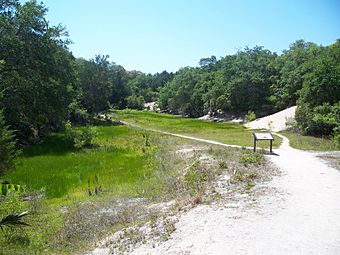Spanish Coquina Quarries facts for kids
Quick facts for kids |
|
|
Spanish Coquina Quarries
|
|
 |
|
| Location | St. Augustine Beach, Florida |
|---|---|
| NRHP reference No. | 72001462 |
| Added to NRHP | February 23, 1972 |
The Spanish Coquina Quarries are a special historical place in St. Augustine Beach, Florida. They are found inside Anastasia State Park, right off A1A. These quarries were added to the National Register of Historic Places in 1972. This means they are recognized as an important part of history in the United States.
Contents
What are the Spanish Coquina Quarries?
The Spanish Coquina Quarries are old sites where a unique type of rock was dug up. This rock is called coquina (pronounced "ko-KEE-na"). For hundreds of years, this rock was very important for building in Florida. The quarries show us how people lived and built things long ago.
What is Coquina?
Coquina is a special kind of rock. It is made mostly of tiny shell fragments and sand. These pieces are cemented together by natural minerals. It forms over a very long time from ancient shell beds. When it is first dug out, coquina is soft and easy to cut. But once it is exposed to air, it hardens. This makes it a great building material.
Why were the Quarries Important?
The Spanish Coquina Quarries were super important to the early Spanish settlers in Florida. They used the coquina rock to build many structures in St. Augustine. This included homes, walls, and especially the famous Castillo de San Marcos.
Building the Castillo de San Marcos
The Castillo de San Marcos is a large fort in St. Augustine. It was built by the Spanish to protect the city. Coquina was the perfect material for the fort. When cannonballs hit the coquina walls, the soft rock would absorb the impact. Instead of shattering, the cannonballs would just sink into the walls. This made the fort very strong and hard to destroy. The quarries provided all the stone needed for this massive fort.
Other Uses of Coquina
Besides the fort, coquina was used for many other buildings. It was used for churches, government buildings, and even private homes. Many of these old coquina buildings can still be seen in St. Augustine today. The quarries were a vital resource for the growth of the city.
Visiting the Quarries Today
Today, the Spanish Coquina Quarries are part of Anastasia State Park. Visitors can explore the park and see the old quarry sites. It's a chance to step back in time and imagine the hard work of the people who dug out the coquina. The park also offers beautiful beaches and nature trails. It's a great place to learn about history and enjoy the outdoors.



